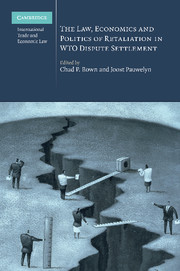Book contents
- Frontmatter
- Contents
- List of tables and figures
- Contributors
- Introduction: trade retaliation in WTO dispute settlement: a multi-disciplinary analysis
- PART I Background and goal(s) of WTO retaliation
- PART II A legal assessment after ten arbitration disputes
- 4 The law of permissible WTO retaliation
- 5 From Bananas to Byrd: damage calculation coming of age?
- PART III An economic assessment after ten arbitration disputes
- PART IV The domestic politics and procedures for implementing trade retaliation
- PART V Problems and options for reform
- PART VI New frontiers and lessons from other fields
- Index
5 - From Bananas to Byrd: damage calculation coming of age?
Published online by Cambridge University Press: 26 February 2010
- Frontmatter
- Contents
- List of tables and figures
- Contributors
- Introduction: trade retaliation in WTO dispute settlement: a multi-disciplinary analysis
- PART I Background and goal(s) of WTO retaliation
- PART II A legal assessment after ten arbitration disputes
- 4 The law of permissible WTO retaliation
- 5 From Bananas to Byrd: damage calculation coming of age?
- PART III An economic assessment after ten arbitration disputes
- PART IV The domestic politics and procedures for implementing trade retaliation
- PART V Problems and options for reform
- PART VI New frontiers and lessons from other fields
- Index
Summary
The issue
The role of countermeasures in the Dispute Settlement Understanding (DSU) as it has evolved in practice is not easily summarized. Even assuming that the purpose of countermeasures is to induce compliance, as has been stressed by a number of arbitrators, the impact of their level to achieve such compliance may vary. As acknowledged by the arbitrator in the Byrd case:
the general obligation to comply with DSB recommendations and rulings seems to imply that suspension of concessions or other obligations is intended to induce compliance, as has been acknowledged by previous arbitrators. However, exactly what may induce compliance is likely to vary in each case, in the light of a number of factors including, but not limited to, the level of suspension of obligations authorized.
And the arbitrator added in footnote 131 to that paragraph:
While the value of the suspension or concessions or other obligations easily comes to mind as a relevant factor in inducing compliance, it must also be acknowledged that the actual role of the value of such suspension in securing compliance or not may vary from one case to the next. In some cases, even a very high amount of countermeasures may not achieve compliance, whereas in some others a limited amount may.
Whereas the role of countermeasures in dispute resolution has been enhanced in the DSU compared with the situation under GATT 1947, the DSU grants Article 22.6 arbitrators limited flexibility in the assessment of countermeasures.
- Type
- Chapter
- Information
- Publisher: Cambridge University PressPrint publication year: 2010
- 1
- Cited by

